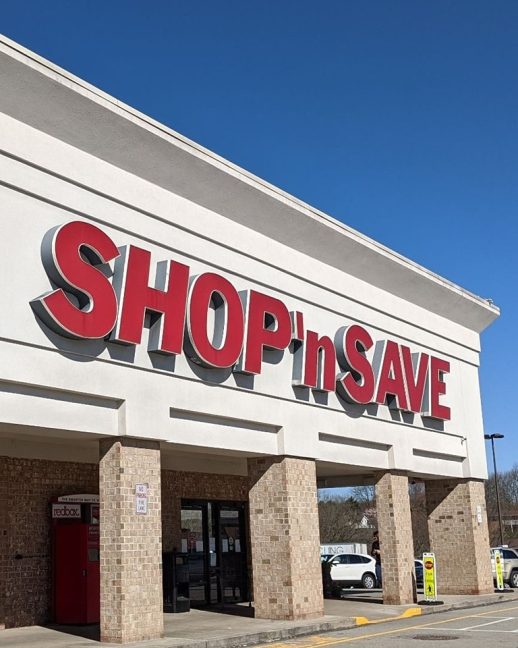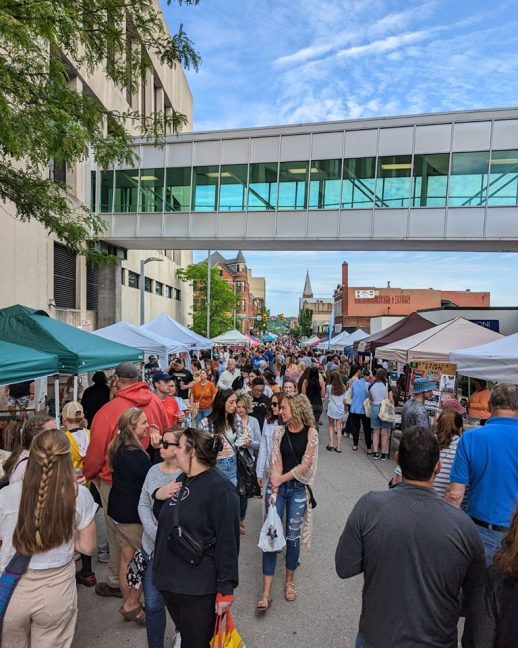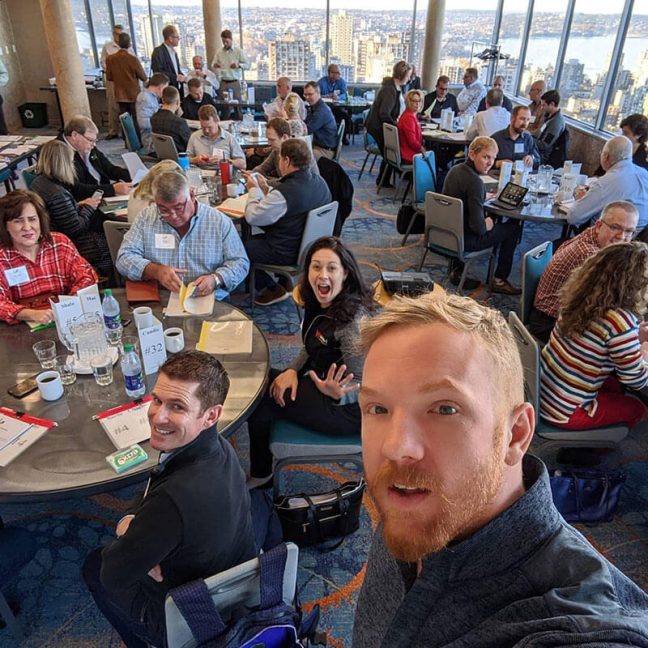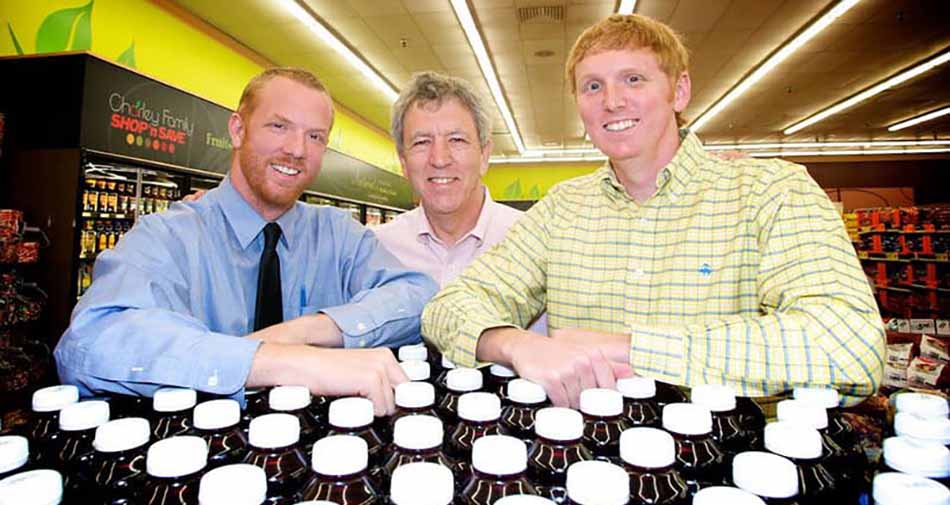Tom Charley and Mike Charley are the fourth-generation owners of Charley Family Shop n’ Save, a three-store group in the Pittsburgh, Pennsylvania, area. Tom Charley spoke to The Griffin Report’s Lorrie Griffith about the company’s origins – rooted in the American dream – and how the fourth generation is working to keep the business strong 125 years after their great-grandfather first came to this country and got into the food business.
Tell me about your path to getting into the grocery business.
My great-grandfather immigrated from Syria in 1900 when he was 16 years old. He didn’t speak English or anything; it’s a crazy story.
He immigrated to western Pennsylvania and started selling produce off the back of a bike, a rickshaw kind of thing. He grew that and got a truck, and then got a warehouse, and then built what became Charley Brothers, which is a food wholesale distributor out of western Pennsylvania. My grandfather and his two brothers built that business.

My father [Ray], at the time [the 1970s], was in law school, and my grandfather and his brothers were looking at succession planning. They didn’t have an obvious successor because my dad wasn’t in the industry at the time, so they ended up selling the wholesale business to Supervalu in, I think, ’79.
A couple of years later, my dad decided he wanted to get back into the industry. My grandfather, while he wasn’t the owner of the business anymore, had stayed on as kind of an advisor to the warehouse, so he was still very connected and very involved in the industry.
My dad and him worked together, and my dad started working in different Shop n’ Save stores in the western Pennsylvania area. He bought his first store in 1983 and from there, he grew it.
He had two stores when I came on board in 2012, so I’ve been doing it for 13 years now. I’d been kind of all over the place professionally before I got into this. I was an auditor in [Washington] D.C. for the Navy, and I also worked in the music industry for a couple years before I came back to the grocery industry.
What did you do in the music industry?
I worked at a company called Creative Artist Agency, which is a music agency that books tours of national acts across the country. I did a little bit of this, a little bit of that in that business down in Nashville.
Did you go to college?
I went to Washington & Jefferson College and got my degree in accounting. That’s why I went to D.C. as an auditor. Then I went back to grad school and got my MBA in marketing and operations. From there, I went to Nashville and worked in the music industry and then came back to Pennsylvania after a couple years.
What do you feel that those detours, if you want to call them that, have done for you as a grocery operator?
I’ve never really thought about that question … it’s a good question. Before Nashville, I’d always lived in areas that knew me. Grocery is extremely public, and I started working when I was 12. In college, a lot of people knew who I was, and then I moved to D.C. with a lot of people from my area. I never really had the ability to escape preconceived notions of who I was.
But Nashville, I moved by myself, didn’t know a soul. I really got to explore who I was as a person, and that was the biggest benefit of Nashville – really becoming confident in my own shoes and comfortable being myself.
I think that’s extremely important for anyone, especially in leadership, to be able to be like, “Hey, this is who I am, and you’re going to accept me or not accept me, but I’m not going to change the person I am to try to appease or make other people feel comfortable.” I definitely have a big personality and I recognize that, but that’s just a part of who I am, and Nashville really helped me develop a comfort with that.
You started working at age 12?
I started working in the stores as a bagger when I was 12 and worked … cashier, office, produce. I think those were the ones that I was allowed to work, because you can’t use a saw or an oven when you’re 12 or 13 years old.
That’s good, kind of starting from the bottom.
Seeing the operations of it, yeah, for sure. When I came back in 2012, I did like a little internship in every department for a number of months, just to kind of wrap my mind around it. Then I was an assistant store manager for a number of months before I stepped away from day-to-day operations.
I got about a year and a half, two years of experience working the store before I was running the operation with my brother Mike.
I would think that really is vital. You need to understand what people do so you can make good decisions.
I agree. I’m sure that I, on occasion, make decisions that impact people that are not favorable. So I try my best to solicit data from everyone it affects when I’m making a decision. What is your perspective, how do you feel, what’s the impact on the operation?
You mentioned that your brother Mike is your business partner. Tell me about your roles.
We overlap substantially. But generally speaking about our different roles, I describe it as Mike is more day-to-day, and I’m more strategic. I’m looking at a little longer-term projects.
A couple of the projects I’m working on right now are how do I get these healthy benefits cards incorporated into my organization and how do I improve our online presence? He’s more like, “Hey, produce manager X, we have to improve your merchandising, so let’s have a meeting and discuss the merchandising you’re doing right now, what the impacts of it are and how we can improve.”
We both do both sides of it, but I skew more to the strategic longer term, and he’s skewed more toward the day to day.
Tell me about your stores.

We have three conventional stores ranging from 27,000 square feet to 50,000 square feet. They’re located in different cities.
Two of the stores are in Greensburg, Pennsylvania – that’s where I live, where I was born and raised – and then we have a store in Murrysville, Pennsylvania, which is about 20 minutes away from our North Main Street store (known as the Route 66 Shop ’n Save).
Our store in Murrysville is our youngest store, which is 11 years old, which is crazy to say that out loud. Time just moves so fast. They’re very conventional, traditional – produce, deli, bakery, meat department with a grocery, center store, dairy.
The 50,000-square-foot store is the one on Pittsburgh Street in Greensburg.
With the extra space, do you have more departments or just devote more space to each department?
That location is kind of like our testing ground. Since we have a lot more space there, we can do different things. We put an entire popcorn department in that store.
Our team makes the popcorn on the [sales] floor. We make kettle corn, caramel, butter, cheddar, all that stuff. When you walk into that store and we’re making popcorn, it smells absolutely phenomenal. We ship the popcorn out to the other stores from that store.
It used to have a bank before we bought it. The bank left, so we opened that area up and put a really nice beer and wine area in.
We had a pharmacy in that store forever, but it [became] untenable, so they closed about five years ago. A couple of years ago, a local pizza shop approached us and asked if we would be willing to put them in the store [in the former pharmacy space]. We said, “Yeah, sure, let’s give it a go.”
So now we have the best pizza in western Pennsylvania in our grocery store, which is so cool, like legitimately the best pizza. We have seating because the liquor laws for selling beer and wine [require them].
What would your customers say sets your stores apart from others?

We have a fresh bakery where we bake in-store. We have cake decorators in-store, which are great. We have fresh meat departments with butchers in-store. Those kinds of things are pretty standard in the conventional world but set us apart from the big-box stores and the Aldis.
But we’re very involved in the community. We are the title sponsor of the largest event in our community, Greensburg Night Market, which is basically like a street fair that happens once a month in in the city.
The city of Greensburg has a population of 20,000 or 30,000 people, and there’s 5,000-plus people that come out these the street fairs. Three or four blocks are just shut down. Local vendors – jewelry vendors, candle vendors, different artisan food vendors, stuff like that. We go to it every month.
There’s also a concert in the park that we’re very involved in, which is the next biggest event in Greensburg.
Describe the economy and demographics in your area.
Greensburg is middle income, generally speaking. I’d say that the city feels vibrant right now. I mentioned the Night Market; you can feel there’s energy in the town. There’s a number of colleges in the area – Seton Hill University, University of Pittsburgh at Greensburg, Westmoreland County Community College – and it feels like the city’s doing well. I couldn’t speak to specific demographics, but the city itself feels healthy right now.
Tell me about your employees. Are you able to retain your employees pretty well?
We’re substantially below market average when it comes to turnover. Substantially. It’s one of the metrics that we measure very closely in our organization, and we are very happy with our organizational turnover – probably half of what the national average is.
I put that to the strength of our staff and our management team. We’re very fortunate with the team that we have in place right now; we have a great team. We have a lot of people that have been with us a significant amount of time.
Are you planning more stores? I know most independent operators say they are always open to looking at opportunities.
That’s hilarious because those are the exact words, literally, I was going to say. The first metric I always utilize when I’m considering expansion is how is this going to improve my life?
If the answer is it will, then it’s something I take seriously. If it’s not, then I don’t. I have a 7-year-old daughter, and I have priorities. Work is extremely important to me, but it’s not the most important thing.

We always like to give an opportunity for grocers to give a shout-out to their wholesaler.
UNFI as our primary wholesaler. They are an essential partner in our operations. They cover all of the bases that we need them to so we can focus on operations.
Is everything perfect all the time? No. Obviously, you know what happened in June [the cyberattack]. But, man, they worked their tail off to correct those issues, so, they’re great partner of ours.
We also pull [product] from my family’s former warehouse. So it’s a pretty cool legacy every time I go down to the warehouse. The road that the warehouse is located on is Charley Brothers Road.
Speaking of family, what are some of the biggest lessons that have been passed down?
The most visceral one – when you’re thinking about the chaos that comes from running a retail grocery store – is, no matter how tense it gets behind the closed doors, no matter how stressful and chaotic … when you walk onto the sales floor, you are now officially “on.” Whatever’s going on behind those doors, it does not matter once you hit the sales floor – treat that sales floor with respect.
That’s one of the things that I’ve always known. In a position of leadership, every single person in that entire building is looking at you at all times, whether you know it or not. As a leader, you have to treat it with respect.
Two, and this is one of my mantras that I go to all the time – there is not one thing that you do in a grocery store that is hard. Anyone could do the things that I do. The challenge is the quantity of things that I do, or anybody does, in a grocery store. That is what makes it hard. You have to make sure that you’re organized and focused on what you’re trying to accomplish. Focus and prioritize.
Another thing that I always kind of go back to – and this is just about business in general – is it’s easy to get lost in the context of running the business, of like A to B to C. But at the end of the day, the business is only about people. Your business only succeeds because of the people.
Your business is a group of people. You’re not a grocery store, you’re a collective of 80 people, and treating them right, being kind and empathetic – these things are extremely important. We’re all going through life; just respect that.
It’s not always easy to keep that top of mind, that, hey, we’re dealing with people. It’s easy to be the cynic – “well, this is a bad employee.” Maybe it’s that they’re not being talked to properly, or maybe they’re just not in the right position or they’re not sure what they’re doing. Try to get to know them and try to understand them a little bit.
You serve on the board of the Pennsylvania Food Merchants Association, correct? How long have you served?
About two years now.
What does being a part of that organization mean to you and your business?
Any of the associations that I’m involved with, such as PFMA or NGA, there are two functions that I look at: what value can I provide and what value can I derive? What can I give and what can I get for being a part of these associations?
It’s the networking and the information that I can get and the access to the people that I need to talk to about understanding the current situation.
It’s extremely valuable to me. I try to really understand what’s going on and see if there’s any way I can influence things, too.
[RELATED: Independent Grocers Gather For 2025 NGA Executive Conference]

